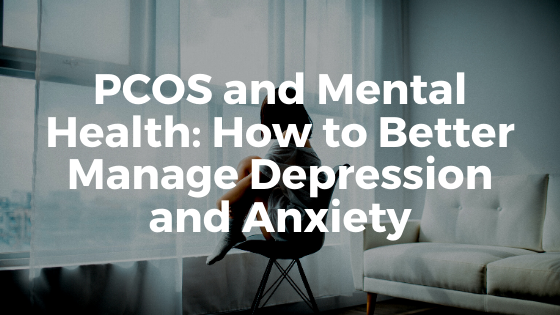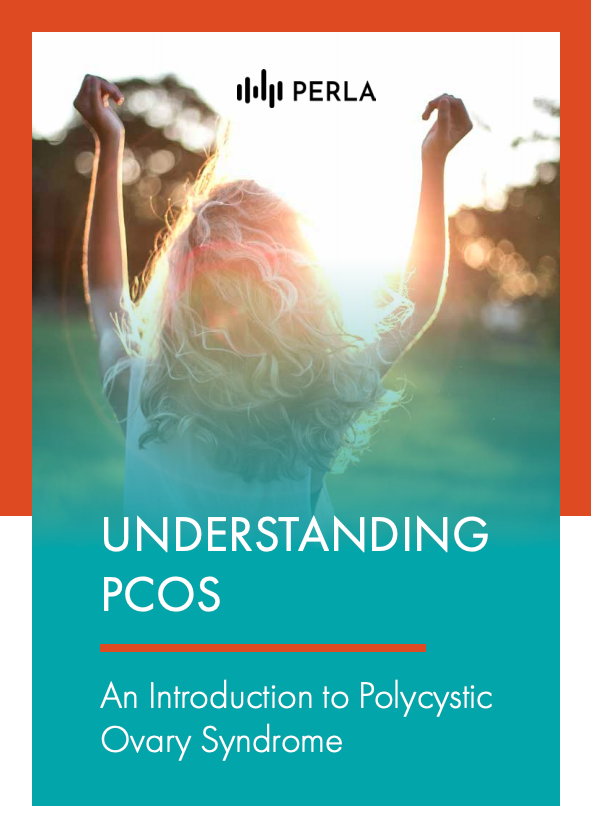Polycystic ovary syndrome (PCOS), a common endocrine disorder that includes symptoms such as obesity, irregular periods, excess hair growth, acne, and infertility, can also lead to mental health problems including anxiety and depression. Empowering yourself and developing coping skills with the help of medical professionals and support groups are essential for managing the psychological impact of PCOS.
The Link between PCOS and Mental Health
Women with PCOS tend to face a lot of issues: accepting their bodies, dealing with the associated health risks, and challenges when wanting to start a family. This can place considerable strain on the emotional wellbeing and personal relationships.
Perhaps not surprisingly, women with PCOS often feel stigmatized, thinking that their appearance does not conform to what is normal. The presence of obesity and excessive body hair can lead to a lower quality of life,1 and also limit sexual satisfaction and self-worth. Infertility and hair loss are often associated with anxiety, while acne was associated with depression.2
It has also been suggested that hormonal imbalance and disturbances in the menstrual cycle may lead to altered mood and psychological distress.3 Mood changes associated with menstrual irregularities are often described as being similar to premenstrual-type symptoms.
Understanding Anxiety and Depression
It is estimated that 40% of women with PCOS experience depression, especially young girls.4 Anxiety and depression often occur together. But they are usually overlooked in women with PCOS and, therefore, left untreated.
While the word “depressed” is often thrown around lightly in casual conversations, depression is actually a serious mood disorder. To receive appropriate treatment, you need to be diagnosed by a psychiatrist. Depression is described as a persistent feeling of sadness and lack of interest that interferes with a person’s normal functioning. Your perspective on everything changes. What used to be a pleasant experience feels meaningless. Nothing seems comforting, pleasurable, or worth doing.
Anxiety, on the other hand, is characterized by intense feelings of worry, nervousness, and distress toward a particular situation. Normal anxiety should not be a cause of alarm. It is typical to feel anxious during a job interview, performing in front of a large crowd, or being diagnosed with a chronic disorder such as PCOS. For people with anxiety disorder, however, their uneasiness or fear is often excessive and can be completely debilitating. Anxiety is far from normal if it affects your daily life.
How to Cope with Anxiety and Depression
Treatment for PCOS patients with mood disorders requires an understanding of the underlying hormonal imbalance and metabolic abnormalities, such as insulin resistance and increased testosterone levels, as these may contribute to the development of anxiety and depression.
There are three approaches to managing the psychological aspects of PCOS:5
- standard psychological therapies,
- relaxation interventions,
- and improving the symptoms of PCOS.
Talk Therapy
Standard psychological therapies, such as cognitive-behavioral therapy (CBT), can help manage depression and anxiety by changing the way you think and behave. It is based on the concept that negative thoughts and feelings contribute to anxiety and depression, trapping you in a vicious cycle. In several studies, CBT was able to improve the mental health aspects of PCOS.6,7 CBT employs different strategies to help you overcome destructive thoughts:
- Journaling or thought records
- Roleplaying
- Stress reduction techniques
- Exposure
- Reframing
Relaxation Therapy
Relaxation therapy, either as a method of simply inducing relaxation or as part of CBT, can help with anxiety and depression. Stress increases the production of male hormones from the adrenal gland and relaxation helps with stress. In a pioneering study, mindfulness training reduced adrenal gland activity in women with PCOS.8
Treating PCOS symptoms
Research suggests that addressing symptoms such as obesity, hirsutism, and infertility improves the psychological distress related to PCOS. Lifestyle modification (diet and exercise) is the most important method of reducing PCOS symptoms.
Women with PCOS with an inactive lifestyle are more likely to have mild depression.9 Regular exercise, even without weight loss, improves ovulation in about half of women with PCOS.10 Loss of abdominal fat and building of muscle mass also improves insulin resistance. Simple exercises like brisk walking can improve body image even if there is no change in BMI.
Do Antidepressants Help?
Antidepressants are medications used to relieve symptoms of mild and chronic depression, anxiety disorders, and other conditions. It is recommended to first focus on the treatment of PCOS before taking antidepressants. Antidepressants do not work immediately and are associated with various side effects such as nausea, dry mouth, constipation, diarrhea, headache, and sleep problems, among others. If you already have an existing condition that requires antidepressant drugs, your doctor may suggest discontinuing the antidepressant gradually while starting PCOS treatment.11 Make sure to listen to your doctor’s recommendation and follow their advice before starting or stopping any treatments.
Ask your physician and PCOS care team for recommendations of mental health programs and specialists that are experienced in working with women with PCOS, as they can support you best on your journey.
Sources:
- Azziz R, Nestler JE, Dewailly D, eds. Androgen Excess Disorders in Women: Polycystic Ovary Syndrome and Other Disorders. 2nd ed. Humana Press; 2006.
- Chaudhari AP, Mazumdar K, Mehta PD. Anxiety, Depression, and Quality of Life in Women with Polycystic Ovarian Syndrome. Indian J Psychol Med. 2018;40(3):239-246. doi:10.4103/IJPSYM.IJPSYM_561_17
- Jones GL, Benes K, Clark TL, Denham R et al. The polycystic ovary syndrome health-related quality of life questionnaire (PCOSQ): a validation. Hum Reprod 2004; 19:371–377
- Sadeeqa S, Mustafa T, Latif S. Polycystic Ovarian Syndrome-Related Depression in Adolescent Girls: A Review. J Pharm Bioallied Sci. 2018;10(2):55-59. doi:10.4103/JPBS.JPBS_1_18
- Barry J. Psychological Aspects of Polycystic Ovary Syndrome. Palgrave Macmillan; 2019.
- Elizabeth M, Leslie NS, Critch EA. Managing polycystic ovary syndrome: a cognitive-behavioral strategy. Nursing for Women’s Health. 2009;13(4):292-300. doi:10.1111/j.1751-486X.2009.01439.x
- Correa JB, Sperry SL, Darkes J. A case report demonstrating the efficacy of a comprehensive cognitive-behavioral therapy approach for treating anxiety, depression, and problematic eating in polycystic ovarian syndrome. Arch Womens Ment Health. 2015;18(4):649-654. doi:10.1007/s00737-015-0506-3
- Stefanaki C, Bacopoulou F, Livadas S, et al. Impact of a mindfulness stress management program on stress, anxiety, depression and quality of life in women with polycystic ovary syndrome: a randomized controlled trial. Stress. 2015;18(1):57-66. doi:10.3109/10253890.2014.974030
- Lamb JD, Johnstone EB, Rousseau J-A, et al. Physical activity in women with polycystic ovary syndrome: prevalence, predictors, and positive health associations. American Journal of Obstetrics & Gynecology. 2011;204(4):352.e1-352.e6. doi:10.1016/j.ajog.2010.12.006
- Palomba S, Giallauria F, Falbo A, et al. Structured exercise training programme versus hypocaloric hyper protein diet in obese polycystic ovary syndrome patients with anovulatory infertility: a 24-week pilot study. Hum Reprod. 2008;23(3):642-650. doi:10.1093/humrep/dem391
- Rasgon N, Elman S. When not to treat depression in PCOS with antidepressants. Current Psychiatry. 2005 February;4(2):47-60


